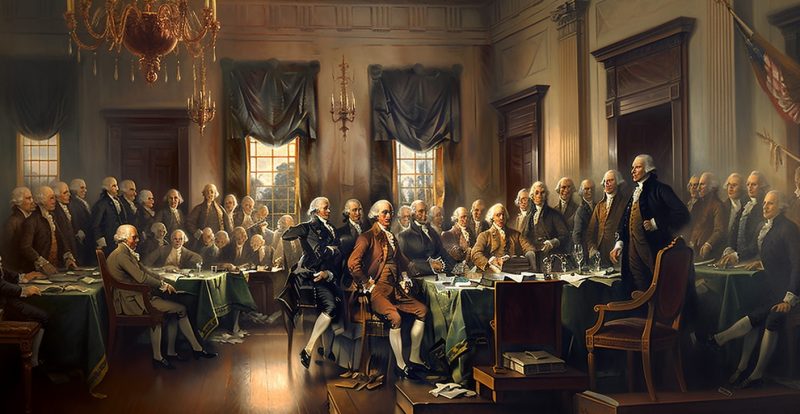Two jurisprudential scholars, intimately engaged within the Federalist Society, have posited that the primordial interpretation of the 14th Amendment delineates Donald Trump’s disqualification from assuming any governmental position.

The question of whether the 14th Amendment could be invoked to prevent former President Donald Trump from seeking the presidency again is complex and multifaceted. There is an ongoing debate among legal scholars, lawmakers, and ethicists surrounding this issue, and the opinions are as varied as the interpretations of the law itself. Here is an in-depth analysis of the perspectives and legal arguments in play.
14th Amendment’s Section 3 and Its Application to Trump
Section 3 of the 14th Amendment outlines the prohibition of individuals involved in insurrection or rebellion from holding federal or state office unless Congress overrides it with a two-thirds majority vote in each House.
Conservative Scholars’ Viewpoint
Two conservative legal scholars argue that Trump is constitutionally barred from running for president due to his role in the January 6 Capitol attack. Their interpretation is based on a broad definition of “insurrection” and does not necessitate Congress’s approval. However, this stance faces the precedent set in the 1869 Griffin case, and doubts arise due to this precedent. The scholars emphasize the importance of the 14th Amendment’s plain text but acknowledge that implementing their findings might lead to chaos and opposition.
Democratic Lawmakers’ Stance
House Democrat Rep. David Cicilline introduced legislation to disqualify Trump, leveraging Section 3 of the 14th Amendment. Yet, legal experts present three critical questions: Did Trump partake in insurrection? To whom does it apply in government? Is the president an “officer of the United States”? Experts argue that Trump’s position might not align with the “officer of the United States” criterion, a perspective bolstered by Chief Justice John Roberts’s prior stance.
Evidence and Arguments for Disqualification
Citizens for Responsibility and Ethics in Washington (CREW) present compelling evidence of Trump’s role in the insurrection, including his manipulation of falsehoods, fostering the “Stop the Steal” movement, coercion of officials, and direct involvement in rallying a violent crowd. They assert that his actions likely meet the criteria for constitutional disqualification, without requiring a criminal conviction.
Potential Legal Mechanisms and Challenges
The possibility of invoking the 14th Amendment against Trump hinges on the answers to several complex legal questions. A potential lawsuit might center on whether Trump’s deeds equate to insurrection or rebellion, and courts may gauge the Fourteenth Amendment’s appropriateness based on evidence from the January 6 Committee and the Justice Department.
Implications for Democracy
While the legal arguments present strength and historical context, the political consequences of barring Trump from office using the 14th Amendment may lead to a destabilization of democracy. The complexity of addressing Trump’s eligibility, given his influence and potential as a major party candidate, further muddies the waters. Some fear that the courts may lack legitimacy to remove him, thereby undermining the rule of law.
Conclusion
The debate surrounding the application of the 14th Amendment’s Section 3 to Trump is a layered and contentious issue. With no precedent existing for its application to a president or ex-president, the matter is likely to be resolved through legal mechanisms and the interpretation of evidence. However, caution is advised due to the potential threat to democracy and the complexity surrounding Trump’s eligibility.
In a broader context, this debate not only touches on the legalities but also underscores the need to safeguard the principles that underpin American democracy. The question is not merely one of law but of values, ethics, and the very nature of governance in a democratic society.
